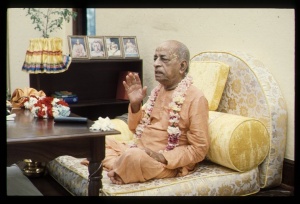SB 11.26.23: Difference between revisions
m (1 revision(s)) |
(Vanibot #0017 edit: indent verse and change id='' to class='' for SB) |
||
| Line 1: | Line 1: | ||
{{info | {{info | ||
|speaker=King | |speaker=King Purūravā | ||
|listener=King | |listener=King Purūravā singing to himself | ||
}} | }} | ||
[[Category:Srimad-Bhagavatam - Canto 11 Chapter 26]] | |||
[[Category:Bhagavatam Verses Spoken by Pururava Maharaja - Vanisource|112623]] | |||
<div style="float:left">'''[[Srimad-Bhagavatam]] - [[SB 11|Eleventh Canto]] - [[SB 11.26: The Aila-gita|Chapter 26: The Aila-gītā]]'''</div> | |||
<div style="float:right">[[File:Go-previous.png|link=SB 11.26.22]] '''[[SB 11.26.22]] - [[SB 11.26.24]]''' [[File:Go-next.png|link=SB 11.26.24]]</div> | |||
{{RandomImage}} | |||
{{SBnotice}} | |||
==== TEXT 23 ==== | ==== TEXT 23 ==== | ||
<div | <div class="verse"> | ||
adṛṣṭād aśrutād bhāvān | :adṛṣṭād aśrutād bhāvān | ||
na bhāva upajāyate | :na bhāva upajāyate | ||
asamprayuñjataḥ prāṇān | :asamprayuñjataḥ prāṇān | ||
śāmyati stimitaṁ manaḥ | :śāmyati stimitaṁ manaḥ | ||
</div> | </div> | ||
| Line 17: | Line 22: | ||
==== SYNONYMS ==== | ==== SYNONYMS ==== | ||
<div | <div class="synonyms"> | ||
adṛṣṭāt—which is not seen; aśrutāt—which is not heard; bhāvāt—from a thing; na—does not; bhāvaḥ—mental agitation; upajāyate—arise; asamprayuñjataḥ—for one who is not using; prāṇān—the senses; śāmyati—becomes pacified; stimitam—checked; manaḥ—the mind. | adṛṣṭāt—which is not seen; aśrutāt—which is not heard; bhāvāt—from a thing; na—does not; bhāvaḥ—mental agitation; upajāyate—arise; asamprayuñjataḥ—for one who is not using; prāṇān—the senses; śāmyati—becomes pacified; stimitam—checked; manaḥ—the mind. | ||
</div> | </div> | ||
{{SBcollapse}} | |||
==== TRANSLATION ==== | ==== TRANSLATION ==== | ||
<div | <div class="translation"> | ||
Because the mind is not disturbed by that which is neither seen nor heard, the mind of a person who restricts the material senses will automatically be checked in its material activities and become pacified. | Because the mind is not disturbed by that which is neither seen nor heard, the mind of a person who restricts the material senses will automatically be checked in its material activities and become pacified. | ||
</div> | </div> | ||
| Line 31: | Line 36: | ||
==== PURPORT ==== | ==== PURPORT ==== | ||
<div | <div class="purport"> | ||
It may be argued that even while closing one's eyes, while dreaming or while living in a solitary place, one may remember or contemplate sense gratification. Such an experience, however, is due to previous sense gratification that one repeatedly saw and heard about. When one restricts the senses from their objects, especially from intimate contact with women, the mind's material propensity will slacken and, like a fire without fuel, eventually die. | It may be argued that even while closing one's eyes, while dreaming or while living in a solitary place, one may remember or contemplate sense gratification. Such an experience, however, is due to previous sense gratification that one repeatedly saw and heard about. When one restricts the senses from their objects, especially from intimate contact with women, the mind's material propensity will slacken and, like a fire without fuel, eventually die. | ||
</div> | </div> | ||
__NOTOC__ | </div> | ||
</div> | |||
<div style="float:right">[[File:Go-previous.png|link=SB 11.26.22]] '''[[SB 11.26.22]] - [[SB 11.26.24]]''' [[File:Go-next.png|link=SB 11.26.24]]</div> | |||
__NOTOC__ | |||
__NOEDITSECTION__ | |||
Revision as of 06:28, 30 November 2017

A.C. Bhaktivedanta Swami Prabhupada
Please note: The synonyms, translation and purport of this verse were composed by disciples of Śrīla Prabhupāda
TEXT 23
- adṛṣṭād aśrutād bhāvān
- na bhāva upajāyate
- asamprayuñjataḥ prāṇān
- śāmyati stimitaṁ manaḥ
SYNONYMS
adṛṣṭāt—which is not seen; aśrutāt—which is not heard; bhāvāt—from a thing; na—does not; bhāvaḥ—mental agitation; upajāyate—arise; asamprayuñjataḥ—for one who is not using; prāṇān—the senses; śāmyati—becomes pacified; stimitam—checked; manaḥ—the mind.
Translation and purport composed by disciples of Śrīla Prabhupāda
TRANSLATION
Because the mind is not disturbed by that which is neither seen nor heard, the mind of a person who restricts the material senses will automatically be checked in its material activities and become pacified.
PURPORT
It may be argued that even while closing one's eyes, while dreaming or while living in a solitary place, one may remember or contemplate sense gratification. Such an experience, however, is due to previous sense gratification that one repeatedly saw and heard about. When one restricts the senses from their objects, especially from intimate contact with women, the mind's material propensity will slacken and, like a fire without fuel, eventually die.